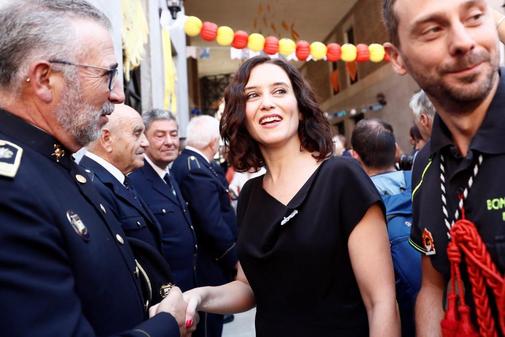- Taxes. Ayuso announces "the largest tax reduction in history"
If you enter 30,000 euros a year and reside in Madrid, you will pay 4,800 euros of personal income tax, while if you live in Barcelona you will have to pay 5,100 euros, 300 euros more . And it is that the Community of Madrid is, together with the autonomies with its own tax regime, the one that less fiscal pressure exerts on its citizens, while Catalonia is the one that most squeezes the taxpayers. While in Madrid the income tax rates range from 18.5% for low income to 43.5% for high income, in Catalonia the rates range from 21.5% to 48%. Not to mention that in Madrid the donation and inheritance tax is practically 100% subsidized.
In this context of low fiscal pressure, the announcement by the new Madrid president, Isabel Díaz Ayuso , that she will immediately undertake "the greatest tax reduction in history" has caused a tsunami in the communities governed by the PSOE. The Valencian president, Ximo Puig, has accused her of doing "dumping" (tax advantages offered by some states or regions to attract companies and individuals) to perpetuate the "tax haven" that, in his opinion, has become Madrid .
The tax reduction announced Tuesday by Díaz Ayuso in his investiture speech especially affects the IRPF and aims to compensate for the "socialist fiscal voracity . " The intention is to reduce each of the five regional sections by half a point, with special attention to families, to reduce the tax burden by 5.5%. In addition, the president of Madrid promised to compensate the people of Madrid for the taxes that the Government of Pedro Sánchez increases.
Both from the autonomous communities governed by the PSOE and from the central government itself, it has gone out in thrombus to accuse Díaz Ayuso of "fiscal demagogy," in the words of Valencian Ximo Puig. He has been the strongest, but criticisms have also been heard of Castilla-La Mancha or Asturias. Puig made a note this Thursday criticizing the new president of Madrid and this Friday has used the microphones of the Being for charging against his proposal.
"You cannot play tax demagogy because you will not be able to finance the social system," said the Valencian, for whom "raising this issue unilaterally is generating fiscal competition between the autonomous communities and continuing that line of tax haven that began in the past".
In his opinion, while “ some Autonomous Communities are absolutely drowned by under-financing and we need to keep taxes because if health, education and social services are not going to be disregarded, what cannot be done is this 'dumping' that generates more inequality". Puig believes that "this kind of tax summer sales" can be announced by Díaz Ayuso for the "capital effect , which attracts the headquarters of many multinationals and this has benefits for Madrid but not for the rest."
For this reason, he proposes that the tax reform should also be addressed in the framework of the reform of the autonomous financing system and advocates returning the management of estate, inheritance and donation taxes to the State. "They must be state taxes because if there is no competition between Autonomous Communities that make no sense in a country ," Puig said.
Along the same lines, the governments of Castilla-La Mancha and Asturias, also socialist, have spoken. "We have always said that it is absurd to lower taxes and at the same time be asking for more resources for regional financing," says Juan Alfonso Ruiz, counselor of the Castilian-La Mancha Treasury, who asked Díaz Ayuso to inform Madrid from where he "will cut the expense ». The Asturian Government, on the other hand, will ask that the future regional financing model meet, among other criteria, the fiscal pressure in each territory. "It makes no sense to generate tax competition between communities, it does not respond to the spirit of the Constitution," said its president, Adrián Barbón.
It is not the first time that socialist autonomous communities accuse Madrid of "fiscal dumping." Already in December 2017, the Government of Andalusia, chaired by Susana Díaz, turned against Madrid for tax rebates. The then president of Madrid, Cristina Cifuentes, reminded her that only that year Madrid had allocated “1,315 million euros to finance the fundamental public services of Andalusia” and invited her to “effectively exercise” her powers, which are “the same” in All communities of common regime.
The Minister of Finance of the Andalusian Government was then María Jesús Montero, now head of this portfolio in the Executive of Pedro Sánchez and also very critical with the announcement of Díaz Ayuso. "This is an equation, income and expenses have to add up, and when the decision is made to lower the income, you have to be guaranteed what happens with the item of expenditure," said the minister, adding: "Or else the expense item or breach the stability rule ».
In response to the accusations, the new vice president of Madrid, Ignacio Aguado, of Citizens, recalled that "nothing prevents socialist governments from lowering taxes" and has argued that his community does not become "a tax hell" as he has done PSOE in other regions . "If in the Community of Madrid it has been shown that low or moderate taxation has worked, has generated economic growth and jobs, we will not apply the fiscal flaws that Pedro Sánchez and his partners of Podemos want," said Aguado.
According to the criteria of The Trust Project
Know more
